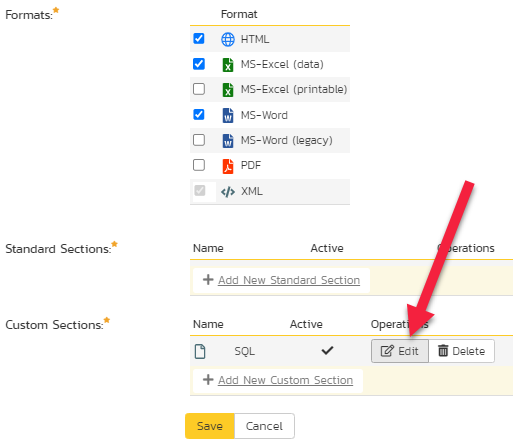Overview
A customer was looking for a simple report that would display a list of Incidents and Requirements, that belong to Releases that:
- have an end date in the past
- are not deleted
- do not have a status 'Canceled'

It will display for each Release:
- The date that each Release was ended
- The name and type of the Release (Major/Minor/Sprint)
- The number of Incidents and Requirements assigned to each Release
Solution
The solution is to use the following ESQL in a custom report section.
Creating the Custom Report
This article assumes you are familiar with the basics of writing custom reports in Spira.
In this example we will be using a custom report with a custom SQL section.
To create the report you need to:
- Go to Administration > Edit Reports
- Create a new Report
- Specify that it should allow generation in MS-Word, Excel, HTML and PDF formats
- Choose to add a Custom Section:

- Then click [Save] twice and you can run your report.
Step1.
Paste into the Query section information below:
SELECT RL.NAME AS Name, RL.RELEASE_TYPE_NAME AS ReleaseType,
RL.REQUIREMENT_COUNT AS No_of_RQ,
COUNT(INC.INCIDENT_ID) AS No_of_INC,
RL.END_DATE AS EndDate
FROM SpiraTestEntities.R_Releases AS RL
FULL JOIN SpiraTestEntities.R_Incidents AS INC ON RL.RELEASE_ID = INC.RESOLVED_RELEASE_ID
WHERE
DiffDays(CurrentDateTime(), RL.END_DATE) < 0 AND RL.IS_DELETED = false AND RL.RELEASE_STATUS_ID != 6 AND RL.PROJECT_ID = ${ProjectId}
GROUP BY RL.NAME, RL.RELEASE_TYPE_NAME, RL.REQUIREMENT_COUNT, RL.END_DATE
ORDER BY RL.END_DATE asc
Step 2.
Copy the template into that section from below:
<?xml version="1.0" encoding="utf-8"?>
<xsl:stylesheet version="1.0" xmlns:xsl="http://www.w3.org/1999/XSL/Transform" xmlns:msxsl="urn:schemas-microsoft-com:xslt" exclude-result-prefixes="msxsl">
<xsl:template match="/RESULTS">
<table class="DataGrid">
<tr>
<th>Name</th>
<th>ReleaseType</th>
<th>No_of_RQ</th>
<th>No_of_INC</th>
<th>EndDate</th>
</tr>
<xsl:for-each select="ROW">
<tr><td><xsl:value-of select="Name"/></td>
<td><xsl:value-of select="ReleaseType"/></td>
<td><xsl:value-of select="No_of_RQ"/></td>
<td><xsl:value-of select="No_of_INC"/></td>
<td>
<xsl:call-template name="format-date">
<xsl:with-param name="datetime" select="EndDate"/>
</xsl:call-template>
</td>
</tr>
</xsl:for-each>
</table>
</xsl:template>
<xsl:template name="format-date">
<xsl:param name="datetime"/>
<xsl:variable name="date" select="substring-before($datetime, 'T')" />
<xsl:variable name="year" select="substring-before($date, '-')" />
<xsl:variable name="month" select="substring-before(substring-after($date, '-'), '-')" />
<xsl:variable name="day" select="substring-after(substring-after($date, '-'), '-')" />
<xsl:variable name="time" select="substring-before(substring-after($datetime, 'T'), '.')" />
<xsl:variable name="monthname">
<xsl:choose>
<xsl:when test="$month='01'">
<xsl:value-of select="'Jan'"/>
</xsl:when>
<xsl:when test="$month='02'">
<xsl:value-of select="'Feb'"/>
</xsl:when>
<xsl:when test="$month='03'">
<xsl:value-of select="'Mar'"/>
</xsl:when>
<xsl:when test="$month='04'">
<xsl:value-of select="'Apr'"/>
</xsl:when>
<xsl:when test="$month='05'">
<xsl:value-of select="'May'"/>
</xsl:when>
<xsl:when test="$month='06'">
<xsl:value-of select="'Jun'"/>
</xsl:when>
<xsl:when test="$month='07'">
<xsl:value-of select="'Jul'"/>
</xsl:when>
<xsl:when test="$month='08'">
<xsl:value-of select="'Aug'"/>
</xsl:when>
<xsl:when test="$month='09'">
<xsl:value-of select="'Sep'"/>
</xsl:when>
<xsl:when test="$month='10'">
<xsl:value-of select="'Oct'"/>
</xsl:when>
<xsl:when test="$month='11'">
<xsl:value-of select="'Nov'"/>
</xsl:when>
<xsl:when test="$month='12'">
<xsl:value-of select="'Dec'"/>
</xsl:when>
<xsl:otherwise>
<xsl:value-of select="''" />
</xsl:otherwise>
</xsl:choose>
</xsl:variable>
<xsl:value-of select="concat($day, '-' ,$monthname, '-', $year , ' ', $time)" />
</xsl:template>
</xsl:stylesheet>
Once that is done, you are ready to run your report.
Viewing the Report
If you run this report in Excel or HTML format, it will generate the following output:
